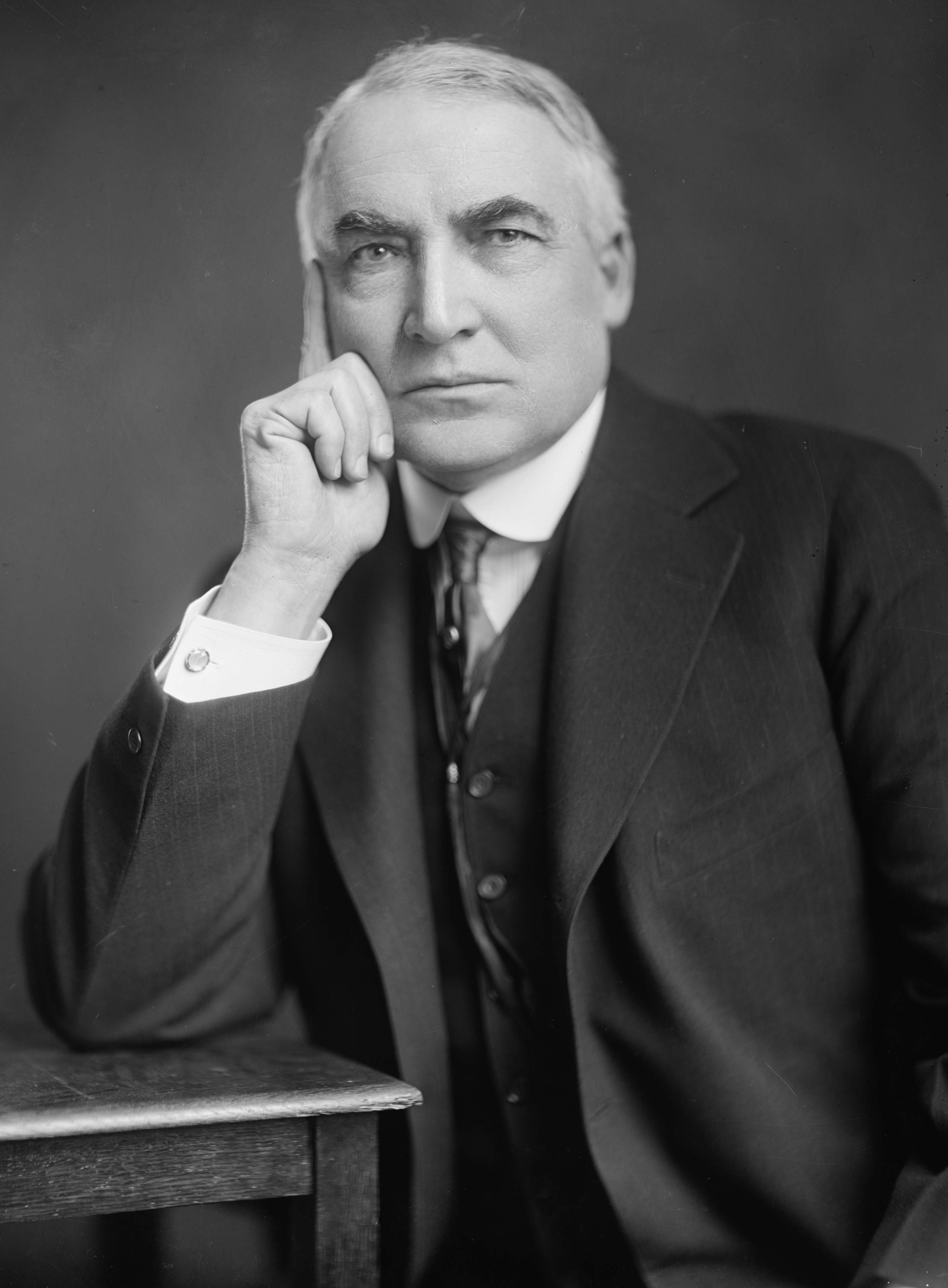Next week marks the 100-year anniversary of the death of the first Baptist president of the United States.
But if “Baptist” wasn’t the first word that came to mind when thinking of Warren Harding, who died in office on August 2, 1923, you’re probably not alone. Even if he was a member of a Baptist church, Harding was one of the nation’s least overtly devout presidents. Those of you who have read Barry Hankins’s Jesus and Gin know that Harding is remembered much more for his poker playing, cigar smoking, Prohibition-era liquor drinking, and – above all – his extramarital trysts than for any semblance of piety.

Harding’s flagrant violations of Baptist teaching could be one of the best pieces of evidence in favor of the view that historical investigations of presidential faith are overrated, because (according to people who hold this view) many of our nation’s chief executives have adopted a veneer of religion more out of political or social aspirations than out of heartfelt conviction. What can we possibly learn about either politics or religion by investigating Harding’s religious views any further?
But personal piety is not the only way to measure the influence of a religious tradition on a president’s thinking. In the case of Harding, the twenty-ninth president’s Baptist affiliation may tell us more about the history of both Baptists and Harding than we might initially assume. Most of all, it may tell us something fascinating about a particular moment in the history of the intersection of religion and politics in the United States.
In an attempt to understand what Harding’s Baptist identity meant to him, I read Timothy George’s “America’s First Baptist President” (a highly informative and thoughtful article which appeared in First Things in 2015) and compared it to the information that Shailer Mathews gave about his Baptist upbringing in his autobiography New Faith for Old.
Mathews and Harding are not often compared. Mathews, after all, was an ordained minister and theology professor. Harding, by contrast, was a newspaper editor, politician, and philanderer.
But both were active Baptists who were part of the same generation and the same northern denomination. Mathews was born to Baptist parents in Maine in 1863. Harding was born in Ohio only two years later and spent his youth among Northern Baptists who probably shared many of the same beliefs and practices as Mathews’s parents and neighbors.

Both were also active in their denomination. Harding was a trustee and deacon at Trinity Baptist Church in Marion, Ohio. Mathews served as president of the Northern Baptist Convention in 1915 at the same time that Harding was an active member of a church that was part of that convention.
And both Harding and Mathews also traveled on religious journeys that took them far from the evangelical strictures of their youth. Both embraced the Social Gospel. Mathews championed it overtly, making it a central part of the liberal theology that he outlined in his book The Faith of Modernism. Harding adopted the precepts of the Social Gospel only implicitly, saying very little about his theological views but weaving references to some of the tenets of the Social Gospel into his presidential speeches.
Indeed, an understanding of liberal Northern Baptists’ exchange of individualistic evangelical piety for a social view of sin and salvation is essential for making sense of Harding’s identity as a Baptist. Harding entered politics at a time when the Social Gospel was remaking both northern Protestantism and northern public life, and the Northern Baptists with whom he was associated were at the forefront of those changes.
For much of the nineteenth century, Baptists in the North were quintessential evangelicals who emphasized a born-again experience of personal conversion and a life of personal holiness. Shailer Mathews recalled childhood Baptist norms that might have been similar to those that Harding might have observed among some of his Baptist associates in a small central Ohio town at the time. Sunday mornings were invariably marked by church attendance, followed by spiritual reading at home. Personal Bible reading was strongly encouraged. And liquor was strictly forbidden, while tobacco, dancing, and card playing were highly suspect.
Harding’s family appears to have adhered at least partially to these widespread late nineteenth-century evangelical norms. His father was a faithful member of a Baptist church, while his mother moved from evangelical Methodism into the even stricter Seventh Day Adventist denomination. Harding himself was baptized by immersion in his teens and decided to join his father’s Baptist church instead of following his mother into Adventism.
But if Harding ever had any genuinely evangelical convictions, most of those seem to have evaporated in college. At Ohio Central College, Harding embraced evolutionary theory and briefly styled himself a freethinker – perhaps even flirting with atheism, as Timothy George notes in his reflections on Harding’s religious journey.
But instead of becoming openly skeptical about religion, like a few other journalists of his day (such as H. L. Mencken), Harding embraced the church and its theology of Christian civilization in its theologically liberal manifestation.
With their anti-creedal views and their championship of individual conscience and the “priesthood of the believer,” the Baptists provided the perfect environment for a liberal rethinking of the faith, as both Harding and Mathews discovered. Although many Northern Baptists remained thoroughly evangelical (or even fundamentalist), some in the denomination became thoroughgoing theological liberals. Mathews was one of those theological liberals. Harding was quite likely another.
Mathews entered Colby College, a small Baptist institution in Maine, with the firmest of conservative evangelical convictions and a hostile disposition toward evolutionary theory, but he discovered that some of the professors at Colby embraced evolution, which they believed was perfectly compatible with Christian theology. Mathews soon did the same as well. At Newton Theological Seminary (a Baptist institution in Massachusetts), he discovered higher criticism and an evolutionary view of the Bible’s composition.
Further graduate study in Germany challenged some of his assumptions about proper Christian behavior. He had grown up in a family that firmly opposed drinking and dancing, but amidst the beer gardens and dance halls of Germany, he began to view such fastidious as highly parochial – even if he himself never strayed into vice.
The most important part of Christianity, Mathews decided, was not the literal words of the Bible nor a set of individually oriented commands but rather a social ethic based on the teachings of Jesus. Christianity must be harmonized with modern science and modern practices, but in its modern form, it could still retain a prophetic voice in promoting world peace and better social relations.
This seems to have been the form of Christianity that Harding adopted. At a Northern Baptist church, he would not be held to a creed or pressed too closely on his precise views on Scripture. At the same time, he seems to have imbibed a good deal of early twentieth-century Social Gospel and liberal Protestant teaching about the importance of Christian civilization, if his presidential speeches are any indication.
As Harding pointed out in his inaugural address, he took the oath of office on a Bible that was open to Micah 6:8, a favorite passage for people who emphasized the social ethic of the Judeo-Christian tradition. “What doth the Lord require of thee but to do justly, and to love mercy, and to walk humbly with thy God?” Harding recited. “This I plight to God and country.”
Later in his short term in office, Harding summarized his concept of Christianity by appealing to some of the tenets of an ecumenical liberal Baptist social vision, which he viewed as almost synonymous with the vision of charitable fraternal orders, such as the Freemasons, of which he was also a devoted member. “We need less of sectarianism, less of denominationalism, less of fanatical zeal and its exactions, and more of the Christ spirit, more of the Christ practice, and a new and abiding consecration and reverence of God,” he declared. “Christ was the Prince of Peace, and we who seek to render His name glorious must move in the ways of peace and brotherhood and loving service.”
If Harding is judged by our own modern concept of what makes a devout Baptist, he seems like an utter failure at best and a blatant hypocrite at worst. He carried on multiple years-long extramarital affairs, fathered a child out of wedlock, and drank heavily even while publicly supporting Prohibition.
But if his political career is judged by the tenets that he himself proclaimed to the essence of Christianity – a movement in “the ways of peace and brotherhood and loving service” – it doesn’t look quite so out of step with his liberal Baptist faith. As president, Harding presided over the most sweeping American disarmament of the twentieth century. He signed into law a bill that provided federal funding for the establishment of 3,000 prenatal health clinics – which for that decade was an unprecedented federal investment in infant and maternal health. He called for federal anti-lynching legislation and even dared to tell a crowd in Birmingham, Alabama, that he favored equal political, educational, and economic rights for African Americans.
Perhaps Harding’s churchgoing was merely a matter of political expediency and his professions of Christian faith merely a façade – although even if that were the case, his fluency in the progressive language of the Social Gospel tells us a good deal about what Harding knew that a politician of that era was expected to profess.
But I doubt that it was merely a façade. Harding included too many detailed references to Christian themes in his speeches, attended too many church services, and was too active in his local congregation to make it likely that all of this was merely a matter of political strategy. While we as historians can never peer directly into someone’s heart, the similarities between Harding’s own religious journey and the religious journey of other liberal Baptists of his time suggest that Harding may have been much more comfortable with liberal Northern Baptists’ understanding of Christianity than we might have assumed.
My guess is that Harding genuinely believed in the social teachings of Christianity – which, like nearly all other liberal Christians of his time, he believed could not be divorced from their grounding in institutional Christianity. The essence of Christianity, he thought, was social rather than individual morality, let alone individual professions of faith – and by that standard, he was a pretty consistent Christian.
But there are some indications that he felt at least a tinge of guilt about his extramarital affairs or other deviations from Christian personal morality. During the final months of his life, even as he continued attending a Baptist church, he abstained from taking communion because he considered himself “unworthy.”
Harding is probably not someone that many Baptists today would consider a worthy exemplar of the faith, but when understood in its historical context, his life shows that whatever else Harding was, he was not a secular person for whom religion was irrelevant. Contrary to popular stereotypes, the era in which Harding was elected was not primarily an era of secularization but rather the heyday of liberal Protestantism. And Harding, despite all of his vices, was likely a genuine believer in the fundamental assumptions of liberal Protestantism and the Social Gospel, which were widely shared among many theologically liberal Northern Baptists.
Harding’s White House may have been filled with whiskey and cigar smoke, but it was also a place where the tenets of liberal Christianity continued to reign, with a churchgoing Baptist president at the helm.













